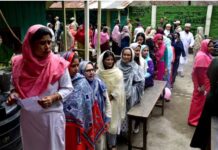Rakhine is burning. The hapless Rohingyas are being butchered, children are thrown into fire, women are disrobed in public before being gang-raped and houses are looted, torched and razed. In the process Rohingya neighbourhoods are destroyed.
In the past, extremist members of the majority Buddhist community carried out such dastardly acts while the security forces looked the other way. Denial was the order of the day and little punitive measures were taken against the perpetrators. Over the last several weeks the situation has taken a turn for the worse. The law enforcement agencies, including the armed forces, have actively unleashed violence. The attack on the security forces allegedly by radicalised Rohingyas was a flimsy pretext for a violent crackdown on this marginalised community. There is a strong body of evidence to argue that such an assault on the Rohingyas was part of a well-prepared strategy involving non-state actors and state agencies. In October 2016, mainstream international media began reporting distribution of lethal weapons among a section of the population in the Rakhine state. This was soon followed by gruesome acts of violence against the Rohingya minority that is now being aptly described as ‘planned genocide’.
Instead of instituting a fair and objective investigation to identify the perpetrators of the attack on the state forces, the security forces engaged in wanton violence that did not discriminate between the innocent and the guilty, young or old, or men and women. Thanks to social media the world has come to learn the extent of such barbaric collective punishment. Images of children being hacked to death and charred bodies being placed in mass graves have finally succeeded in convincing the skeptics about the ghastly reality of the Rohingyas in Rakhine.
Experts and the international media have put various labels on the action of the Burmese government – “ethnic cleansing”, “crime against humanity” and “genocide”. The sheer scale of evidence (documentary and satellite generated images) has debunked the lies and hypocrisy of the government that is being effectively led by the noble laureate Ms. Aug San Suu Kyi. Instead of mitigating the suffering of the Rohingyas the regime exacerbated their woes by denying passage of humanitarian aid to the affected people, engaging in crude censorship if the media, and barring independent observers and human rights monitors from accessing the area. Ms. Suu Kyi is reported to have been “upset” about international community’s overt focus on one side of the conflict without “having the real information”. It will be interesting to know what “real information” the once-icon-of-freedom was referring to.
Anyone with rudimentary knowledge of the Rohingya situation is aware that thousands of people in North Maungdaw are trapped in a ‘locked down’ area for more than a month and a half without access to urgently needed humanitarian aid and the freedom to move and seek protection from persecution. Harvests have been destroyed creating conditions of starvation for thousands. The Arakan Project and other sources have reported that after the clashes between Rohingya armed groups and Myanmar’s military, two helicopter gunships opened fire on fleeing villagers while ground troops attacked civilians, including women, children and the elderly, with bayonets and guns. So far about 70 people have been killed that the government wants the world to believe were “insurgents”.
Ms. Suu Kyi may well be reminded that after the violence that flared up in 2012 and 2013 the Rohingyas have been forcibly removed from their own homes in various townships and been placed in ghettoes without having access to livelihood opportunities, education and healthcare. The dire conditions are reminiscent of conditions of the members of the indigenous African community under the apartheid regime of South Africa. If apartheid is understood as a political and social system that promotes racial discrimination in favour of a particular community then at the moment no country in the world can compete to fittingly qualify the top spot of an apartheid state other than Myanmar.
Daw Suu Kyi’s attention also needs to be drawn to the recent study conducted by the reputed International State Crime Initiative of the University of London. The study confirmed “systematic, widespread, and ongoing violations, including: institutional discrimination, torture, sexual violence, arbitrary detention, destruction of communities, apartheid structures of segregation, targeted population control, mass killings, land confiscation, forced labour, denial of citizenship and identity, severe restrictions on freedom of movement and access to healthcare, food, education, and livelihood opportunities; and state-sanctioned campaigns of religious hatred”. In no uncertain terms it concluded Myanmar’s state’s policies of persecution of Rohingyas as “genocidal practice”.










